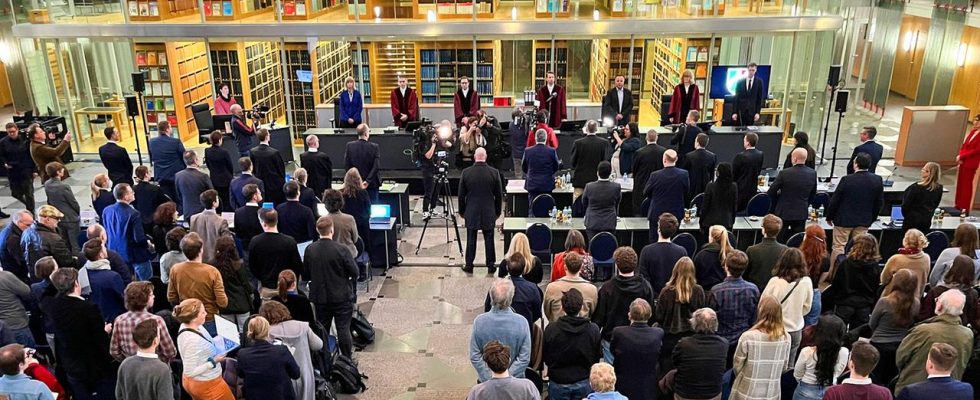There is a lot at stake for the AfD at the Münster Higher Administrative Court: Can the Office for the Protection of the Constitution observe the party as a suspected case? Right at the beginning of the appeal process, the lawyers failed with several applications.
With several applications in the party’s appeal against the Office for the Protection of the Constitution, the AfD tried to prevent a quick decision on its classification as a suspected right-wing extremist case. However, the party failed right at the start of the hearing at the Münster Higher Administrative Court.
Among other things, the court rejected an application against the appointment of the Senate. The presiding judge Gerald Buck accused the AfD of abusing the law. The party did not present any new arguments. The request was made across the board and obviously without any basis.
Postponement is out of the question
The court also rejected a request to postpone the hearing. The AfD’s lawyer, Christian Conrad, justified this by saying that it was not possible to respond to the approximately 4,200 pages of documents and 116 hours of video material submitted in January in such a short time.
By rescheduling the trial dates originally planned for the end of February, the Senate had already complied with a request from the AfD in view of the extensive material.
AfD demanded access to reports
The lawyer also requested access to reports on the AfD from Saxony and Saxony-Anhalt as well as a new assessment of the entire party by the Federal Office that has not yet been published. The court reserved the right to make a decision on this.
The AfD representatives also requested that several employees of the Federal Office for the Protection of the Constitution be heard as witnesses. The representative of the Office for the Protection of the Constitution described the cumbersome way in which the evidence was presented as a “delay in the process”. The AfD’s lawyer rejected the accusation.
Court allows publicity
In the morning, observers had to leave the courtroom because the AfD wanted to exclude media representatives and spectators for a certain point that concerned content that was not intended for the public.
The Senate did not follow this. He explained his decision by saying that it was not clear why public disclosure of the facts would endanger public safety.
Cologne court confirmed classification
The oral hearing, which will take place in the hall of the Higher Administrative Court, is scheduled for two days until Wednesday. The 5th Senate should clarify whether the ruling from the lower instance at the Cologne Administrative Court stands. The Federal Office for the Protection of the Constitution (BfV), based in Cologne, had classified the AfD and the youth organization Junge Alternative (JA) as suspected right-wing extremist cases.
The judges in Cologne confirmed this view in March 2022 after the AfD tried to defend itself against this assessment. Since then, the party and the JA have been allowed to be monitored using intelligence means. The AfD has appealed against the first instance ruling.
Revision is not excluded
It was initially unclear when there would be a verdict at the OVG in Münster. After a decision by the Higher Administrative Court, an appeal would still be possible, which the Federal Administrative Court in Leipzig would have to decide on.
Before the start of the negotiations, the deputy AfD federal chairman, Peter Boehringer, answered the question on Deutschlandfunk about how the party would deal with a defeat. Given the scope of the questions to be clarified, a decision after a maximum of two days of oral negotiations would alone be reason enough for a revision. However, the Federal Administrative Court would only examine the OVG’s decision for possible legal errors. Questions about content no longer play a role there.
Protests in front of the Courthouse
From the party leadership, former Bundestag member Roman Reusch and Federal Treasurer Carsten Hütter were in court in Münster.
The start of the negotiations was accompanied by protests against the AfD in the city center. The police had cordoned off a large area of the court building.

